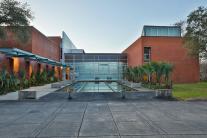or reload the browser
UL Lafayette lab school’s new home will create hub for innovative learning, teaching
Mon, 04/03/2023 - 12:00amThe University of Louisiana at Lafayette’s Learning Lab has a home. The laboratory school will be housed in a two-story, roughly 70,000-square-foot building in UL Lafayette’s Research Park.
The building was previously occupied by the National Marine Fisheries Service, a federal agency of the National Oceanic and Atmospheric Administration. U.S. Sen. John Kennedy announced the building’s transfer to the University on Friday.
Dr. Paula Montgomery, interim dean of the College of Education & Human Development, said the Learning Lab will offer its students an education that features model teaching methods and an innovative curriculum that encompasses interactive and outdoor learning experiences. “Beyond a cutting-edge learning and teaching environment, the Learning Lab will be a hub for teaching practice and theory, education-based research and interdisciplinary collaboration,” she said.
“Acquiring a home for the lab school moves us that much closer to opening its doors,” Montgomery added.
A projected opening date has yet to be determined. Dr. Nathan Roberts, a professor and the college’s former dean, explained that “renovations to convert the building into a space for innovative learning, teaching and research is one of the priorities.”
Roberts, who has been a driving force in implementing the lab school, said initial proposals call for pre-kindergarten through fifth-grade students to enroll at the school. Expansion through eighth grade during the first several years would be next, followed by a high school. It’s a framework based “on substantial interest from parents of potential students, school administrators, public officials and community organizations. So, we’re excited to have the capacity to serve a wide range of people and foster partnerships,” he explained.
UL Lafayette’s Learning Lab will operate as an independent school district, in the same manner as lab schools at LSU and Southern University. It will be funded with a blend of tuition and state support.
Donor support also will be essential in the Learning Lab’s creation and its activities. Funds raised will be part of the largest comprehensive fundraising initiative in University history. Together: The Campaign for the University of Louisiana at Lafayette aims to raise $500 million. Among the campaign’s priorities: the renovation, construction and maintenance of academic spaces, including labs and classrooms.
Beyond the Learning Lab’s core mission, which places an emphasis on student research and active learning, the opportunities the school will afford are considerable. Conducting methodology research to determine the efficacy of curricula and programs is among them.
Such research will yield best practices that will be shared with school districts across the state and nation. It will also provide a built-in mechanism to continually assess and strengthen the school’s curriculum. The lab school will also foster multidisciplinary collaboration across campus.
The majority, if not all, of University students studying and training to become teachers will gain classroom experience at the lab school, in addition to their field experiences in area school districts, said Dr. Aimee Barber. She is an assistant professor in the college’s Department of Educational Curriculum and Instruction who co-chairs a faculty and staff committee overseeing establishment of the school. Dr. Doug Williams, a professor who directs the college’s Center for Innovative Learning and Assessment Technologies, is also co-chair.
Barber explained: “The intent will be to immerse our teacher candidates in a space that enables them to not only learn about global best practice, but actually implement best practice as part of their teacher preparation.”
“So, in their junior year, they will be immersed in laboratory school classrooms in preparation for their final year, which is a year-long residency in area public schools,” she added.
The new lab school won’t be the University’s first. The F.M. Hamilton Laboratory School, founded in 1939, was an on-campus elementary school where student-teachers honed their classroom skills. It closed in 1977, during a period when “national trends – influenced in large part by federal policymakers – toward conventional education models over progressive ones gained traction,” Roberts explained.
“The need for progressive education models and the kind of learning environments lab schools provide, however, has returned. And, as one of the state’s largest contributors to its teacher workforce, the University is well-positioned to capitalize on that,” he added.
Learn more about UL Lafayette Learning Lab. To support the lab school, contact Nicole Jones, senior director of Development, at nicole.jones@louisiana.edu or 337-482-0934.
Photo caption: The University of Louisiana at Lafayette’s Learning Lab has a home. The College of Education & Human Development’s laboratory school will be housed in a two-story, roughly 70,000-square-foot building in UL Lafayette’s Research Park.

